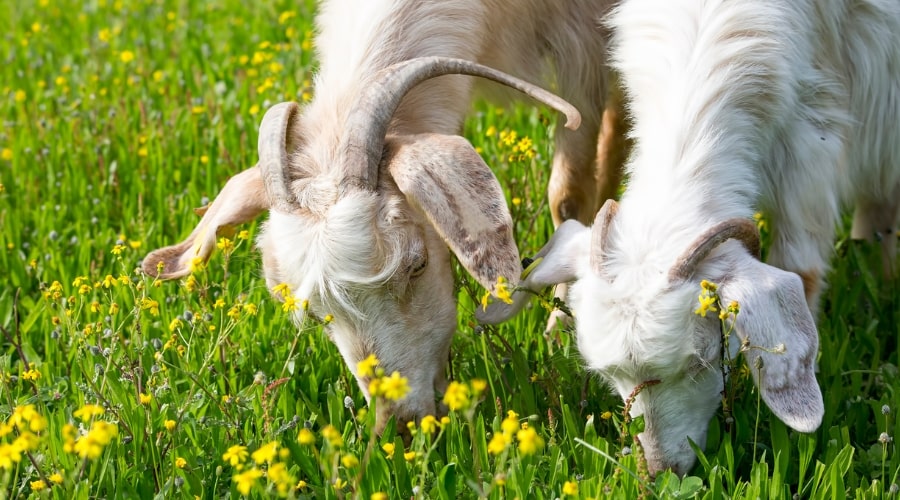Selecting the right breed is essential for raising goats for meat. Meat goat breeds vary in size, growth rate, and adaptability, making it important to match the breed to your production goals and local conditions. Here is a detailed guide to the most popular meat goat breeds.
Boer Goats
Boer goats are one of the most popular meat goat breeds worldwide. They are known for their fast growth rate, large size, and excellent meat quality. Mature Boer goats can weigh between 200 to 300 pounds, making them highly productive for meat production.
Boers are hardy and adapt well to various climates, though they thrive best in warm, dry environments. Their muscular build and high carcass yield make them a top choice for commercial operations. Additionally, they are docile and easy to handle, which is beneficial for beginners.
Kiko Goats
Kiko goats are another excellent breed for meat production. Originally from New Zealand, Kikos are known for their hardiness and resistance to disease. They require minimal maintenance and perform well in low-input systems.
Kikos grow quickly and produce lean, flavorful meat. While they may not be as large as Boer goats, their ability to thrive in harsh conditions makes them a cost-effective choice. Kikos are ideal for farmers looking to raise goats on pasture or rough terrain.
Spanish Goats
Spanish goats are a versatile meat breed that has been raised in the United States for centuries. They are medium-sized and produce high-quality, lean meat. Spanish goats are highly adaptable and can thrive in a variety of environments, including rugged and dry areas.
These goats are low-maintenance and resistant to many diseases and parasites. Their natural browsing ability makes them an excellent choice for managing vegetation while producing meat. Spanish goats are a good option for small-scale farms or mixed-species grazing systems.
Myotonic Goats (Fainting Goats)
Myotonic goats, also known as fainting goats, are a unique breed used for meat production. They are medium-sized and produce tender, flavorful meat. Their slower growth rate compared to Boer goats is offset by their high muscle mass and feed efficiency.
These goats are easy to manage due to their calm temperament. They are well-suited for small farms and specialty meat markets. While not as commonly raised as other breeds, Myotonic goats offer a niche option for meat production.
Savannah Goats
Savannah goats are large, hardy animals bred specifically for meat production. They are similar to Boer goats in size and carcass quality, with mature weights ranging from 200 to 250 pounds.
This breed is highly resistant to disease and parasites, making it a low-maintenance choice for commercial meat production. Savannah goats thrive in warm climates and are well-suited for extensive grazing systems. Their adaptability and robust health make them a reliable option for farmers.
Nubian Goats
Although Nubian goats are primarily known as a dairy breed, they are also used for meat production. They are larger than most dairy breeds, with mature weights of up to 175 pounds. Nubians produce flavorful meat with a good fat-to-lean ratio.
This breed is adaptable and can thrive in a variety of climates. Their dual-purpose nature makes them a good choice for farmers who want to produce both milk and meat. However, they require more feed and management compared to traditional meat breeds.
Selecting the Right Breed for Your Farm
When choosing a meat goat breed, consider your specific goals and resources. For high-yield commercial operations, Boer and Savannah goats are excellent options. If you prefer a low-maintenance breed for pasture-based farming, Kiko and Spanish goats are ideal.
Evaluate your local climate and available forage. Hardy breeds like Kiko and Spanish goats perform well in areas with limited resources. If you have access to high-quality feed, larger breeds like Boers may be more profitable.
Checklist for Raising Meat Goats
- Select breeds that align with your production goals and local conditions.
- Provide secure fencing and adequate shelter.
- Develop a balanced feeding plan with access to fresh forage.
- Implement a health management program, including vaccinations and parasite control.
- Research market demand for goat meat in your area.
By focusing on the right breed and proper management, you can establish a successful meat goat operation. Matching the breed to your resources and market ensures profitability and long-term sustainability.


